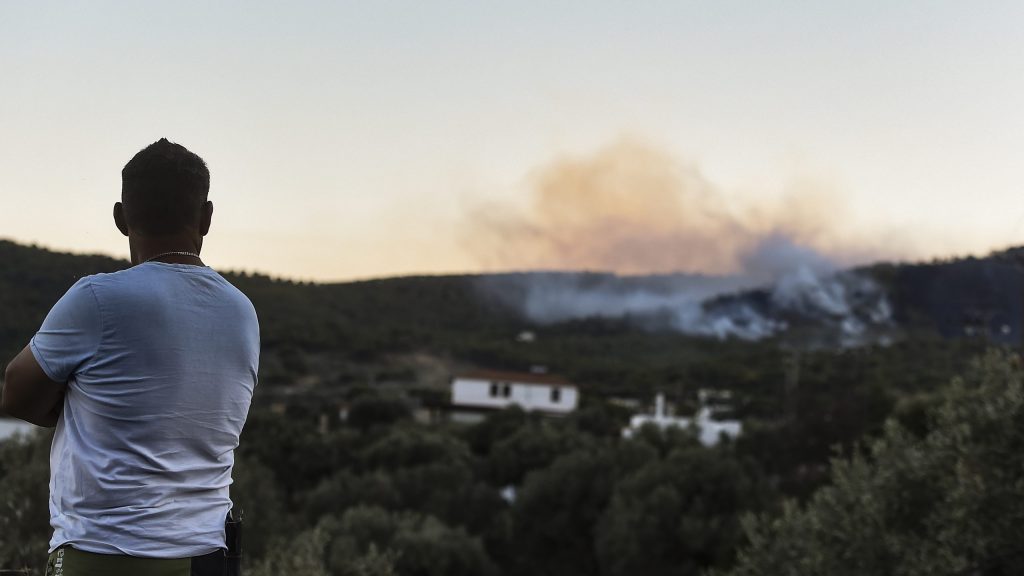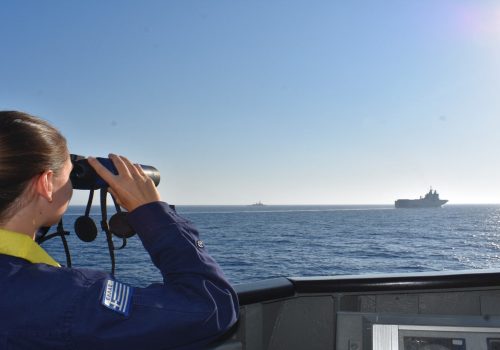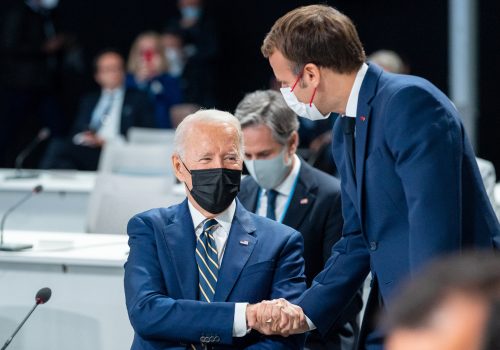When it comes to climate change, the European Union (EU) needs to once again view the Mediterranean Sea as the center of the world.
For millennia, the Mediterranean has facilitated trade and exchanges that made it a crossroads for civilizations. Known as Mare Nostrum (“Our Sea”) at the height of the Roman Empire, it forged the lands around it into a varied yet distinct region, with the coastal environment serving as the common denominator for diverse peoples. Today, the Mediterranean faces rising temperatures and tides in an existential test with sizable socioeconomic and geopolitical implications—and how this crossroads of Europe, Africa, and Asia face these challenges carries consequences for countries and peoples well beyond its shores.
As Mediterranean nations respond to the devastating effects of climate change, their actions may aggravate and alter geopolitical tensions, strain country-level stability, and increase security threats in the region. How the EU addresses civil protection, international cooperation, energy and water availability, and migration flows will determine not only peace and security in its neighborhood, but also its own future. This requires a regional approach to the vulnerable coastal ecosystem, and Greece offers some early signals.
Of course, Europe is not the only area grappling with these challenges. In its first National Intelligence Estimate on Climate Change, the United States warns that no country will be spared from the challenges directly related to climate change. Indeed, the risks are systemic in nature. Natural disasters caused by climate change are upending lives the world over, since natural disasters have longer-term consequences for nature, societies, and economies.
Addressing these systemic challenges needs to top the national security considerations of all countries. It also needs to be the priority of multilateral collaboration not just for national goals of carbon neutrality, but also in rethinking global supply chains, food systems, and economic interdependencies.
Faster warming in the Eastern Mediterranean
But the stakes are especially high for coastal ecosystems: global warming, sea-level rise, and the increased intensity and frequency of major weather events are all predicted to hit coastal nations (such as the Mediterranean countries) particularly hard, raising the urgency for climate change adaptation and resilience. And the Eastern Mediterranean is particularly vulnerable:
- High-resolution climate simulations predict that temperature increases will severely affect the Eastern Mediterranean over this century.
- Already warming 20 percent faster than the global average, the entire Mediterranean region’s temperature is projected to rise 2.2 degrees Celsius by 2040, reducing precipitation by at least 10 to 15 percent and up to 30 percent in Southern Europe.
- Demand for water is projected to at least double (and maybe even triple) by 2050, while coastal zones will face flooding, erosion, and the salinization of river deltas and aquifers.
The socioeconomic implications are significant, as the coastal economy is of primary economic importance for many Mediterranean countries.
Climate change as a geopolitical challenge
For the countries of the Mediterranean, the strain of global warming on energy and food systems is projected to increase the risks of domestic instability, while population growth will add to migration pressures and, in turn, to geopolitical tensions. Environmentalists are looking beyond borders for the answers. Olivia Lazard, a visiting scholar at Carnegie Europe, calls for an approach that exceeds the national boundaries to account for “a new reality that will be defined by geography and climate more than any time in the modern historical experience.”
Although the risks of global climate change cannot be addressed by any country alone, they nevertheless exacerbate a number of risks to national security interests, from physical impacts to security challenges. Those risks need to be assessed by each nation’s intelligence community, including the potential of greater geopolitical tension over an uncoordinated climate response and the geopolitical effects of the energy transition to carbon neutrality.
For the Mediterranean nations, a regional and comprehensive approach to climate change, including the physical and economic effects, will help determine and highlight the security challenges for the area and for the West as well. Currently, the UN Environment Program Mediterranean Action Plan (UNEP/MAP) provides a comprehensive assessment of the state of the environment and development in the region, while the Barcelona Convention adds a framework for climate action.
But the EU also needs to adopt a systemic approach to climate mitigation and adaptation efforts for the whole of the Mediterranean ecosystem, based on its own assessment of the security challenges. This should include an ambitious financing and technology assistance drive to support energy transition in a region largely dependent on hydrocarbons but with a massive potential in renewable energy. Increasing the EU’s stabilizing role in the eastern Mediterranean, the Middle East, and Africa would also help the region counterbalance the influence of other regional powers and China.
A high-stakes role for Greece
Greece, a European country on the EU’s southeastern tip, is at the forefront of this struggle. For one, climate change is an existential threat for Greece’s natural environment and coastal economy, including tourism. As a frontier state, it also bears the burden of protecting EU borders from irregular migration and terrorist threats.
For Greece, potential resources and partners extend beyond the EU. The country can build on its NATO membership to actively grow Europe’s security-related climate response capabilities in the region. The nation also can draw on its traditional ties in the Eastern Mediterranean, and beyond to the Middle East and the Gulf, to expand its partnerships in addressing the effects of climate change through trade and investment.
Indeed, Greece is leading the shift to renewable energy in the region and is planning electricity interconnectors that can bring the untapped green energy potential of the Eastern Mediterranean to Europe; according to the Mediterranean Experts on Climate and Environmental Change network, renewables are projected to nearly triple by 2040 in the Mediterranean basin. In its proactive scenario, they would account for about 70 percent of total installed capacity and more than 50 percent of electricity generation—leading to a drastic restructuring of the power-generation infrastructure that would also allow the export of green energy to Europe. For instance, an agreement signed by Greece and Egypt last October for an electricity interconnector between the two countries could open the European market to renewable energy producers in nations vulnerable to both climate change and the disruption of the energy transition.
Putting the climate crisis at the center of foreign policy and national security, as the Biden administration has done, is the first step for the countries of the region and the EU to put forward and coordinate policy proposals to help mitigate the effects of climate change. A climate action plan that addresses its impact on the Mediterranean as the vulnerable, interdependent ecosystem that it is, while also accounting for its effect on migration, would go a long way to that effect.
The idea of the Mediterranean Sea as a center has currency—for the region, certainly, but also beyond it. Given the physical, economic, and geopolitical stakes, protecting the crossroads of three continents may still define the direction of our world.
Katerina Sokou is a nonresident senior fellow at the Atlantic Council’s Europe Center and the Washington correspondent for the Greek daily Kathimerini and SKAI TV. Follow her on Twitter @KaterinaSokou.
Further reading
Thu, Oct 7, 2021
Greece and France give European strategic autonomy a shot
New Atlanticist By Katerina Sokou
A new defense pact between the two aims to address instability in the Mediterranean by tackling multiple challenges in the region.
Wed, Nov 3, 2021
Can innovation save the planet?
New Atlanticist By Dan Peleschuk
Policy heavyweights Bill Gates and John Kerry and experts from the UAE and Kenya joined the Atlantic Council at COP26 in Glasgow, Scotland, to discuss the technological breakthroughs that can make a lasting impact on climate change.
Fri, Nov 19, 2021
Climate security can help bring the US and France together once again
New Atlanticist By Marie Jourdain
After strained ties caused by AUKUS, how should the United States and France repair their bilateral relationship? By spearheading climate security.
Image: A Greek man watches a wildfire burn south of Athens, Greece, on August 16, 2021. Photo by Dimitris Lampropoulos/NurPhoto/REUTERS



